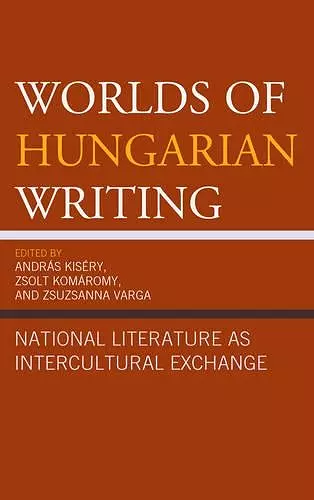Worlds of Hungarian Writing
National Literature as Intercultural Exchange
Zsuzsanna Varga editor Zsolt Komáromy editor András Kiséry editor
Format:Hardback
Publisher:Associated University Presses
Published:12th May '16
Currently unavailable, and unfortunately no date known when it will be back

Worlds of Hungarian Writing responds to the rapidly growing interest in Hungarian authors throughout the English-speaking world. Addressing an international audience, the essays in the collection highlight the intercultural contexts that have molded the conventions, genres and institutions of Hungarian writing from the nineteenth century to the present. They are mapping some of the ways in which a modern literature is produced by encounters with languages, cultures, and media external to its traditionally conceived boundaries. But rather than viewing intercultural exchange as an external force, the collection recognizes its enabling importance to the globalizing reception and circulation of Hungarian writing over the continuities and constraints implied by more traditional national narratives. Worlds of Hungarian Writing posits intercultural exchange as the very substance of a literary culture.Discussions of the politics of appropriation and translation, of the impact of émigré writers and critics, and of the use of world-literary models in genre-formation complement studies of the fate of western leftist critical theory in post-1989 Hungary, of the role of African-American models in contemporary Roma culture, and of the use of photography in late 20th-century prose. The volume spans a wide generic range, from the achievements of such canonical 19th-century critics and poets as József Bajza and János Arany, to neglected women authors-translators such as Theresa Pulszky, to modernist writers and critics like Antal Szerb and György Lukács, and to the contemporary novelists Péter Esterházy, Péter Nádas, and László Krasznahorkai. Each essay is an original contribution to comparative literature and to the study of this Central-European literature, but is intended to be accessible to readers unfamiliar with its traditions.
The editors' Introduction is a model of its kind. Reading it, I found myself nodding in vigorous agreement throughout and underlining virtually every sentence.... [T]hose with an interest in any of the authors or topics surveyed in this review will find that the relevant chapter repays the concentration required to profit from it, and that nearly all of the Introduction can be recommended without reservation. Certainly, the volume's capacious framework makes available a wide range of material on what we should now perhaps call "literature in Hungary/Hungarian.".... [T]his volume...deserves a place in the library of every university that offers courses in comparative literature, as nothing remotely like it is currently available. * Hungarian Cultural Studies *
Worlds of Hungarian Writing fulfils and over-fulfils [sic] every expectation raised by the title. . . . each and every chapter in the volume is informed by its writer’s commitment to engaging the reader of whatever academic orientation in a meaningful dialogue with the texts and contexts under examination. * Slavonic & East European Review *
The volume does not present intercultural interaction as binary, onesided or total. It explores various identities, histories of reception, and cultural exchange that have been neglected by a homogenously constructed Hungarian literary historiography based on nationalism. The volume thus is of great importance: it introduces how Hungarian literature can be presented through literary schools such as Postcolonialism, Gender Studies and New Historicism. This approach gives the reader a possibility to deconstruct the linear, national and simplified history of Hungarian literature: the one that is often exclusively present in the elementary and high schools of Hungary. * Comparative Literature Studies *
ISBN: 9781611478402
Dimensions: 235mm x 160mm x 26mm
Weight: 599g
284 pages